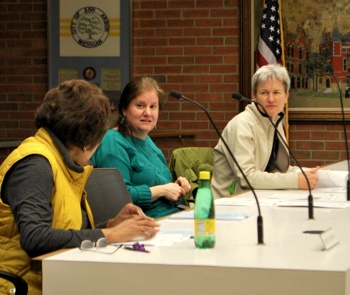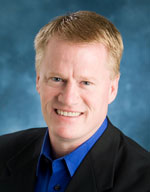Planning Bylaws Clarify Council Interactions
Ann Arbor planning commission meeting (Feb. 20, 2014): Wrapping up a process that began last year, planning commissioners voted to revise their bylaws related to two issues: how city councilmembers interact with the commission; and public hearings.

From left: Ann Arbor planning commissioners Eleanore Adenekan, Diane Giannola and Bonnie Bona. (Photos by the writer.)
Commissioners had debated the proposed revisions at a Feb. 4, 2014 working session. Some of the same issues were raised during the Feb. 20 discussion, which was relatively brief.
One revision clarifies the limitations on a city councilmember’s interaction with the commission. The revised section states: “A member of the City Council shall not be heard before the Commission during the Councilmember’s term in office.” The intent is to prevent undue influence on the commission, and to avoid the possibility of legal action against the city.
Other revisions affect speaking turns at public hearings. The intent is to clarify how many turns the same person can speak at a public hearing, and how public hearings are continued if an item is postponed.
In other action, commissioners recommended rezoning a parcel on the city’s north side to public land (PL). The 2.2-acre site at 3301 Traverwood Drive, donated to the city by developer Bill Martin, is being added to the adjacent Stapp Nature Area, near the Leslie Park golf course. It was originally zoned R4D (multi-family dwelling) and had been part of a larger site that’s being developed with an apartment complex.
During communications, Kirk Westphal reported on a project that the environmental commission is working on: a neighborhood mini-grant program. Volunteers would coordinate a competitive grant program for community groups, who could apply to fund projects that address one of the city’s goals in its sustainability framework. That’s in the planning stages, he said.
Westphal also distributed a copy of a resolution recently passed by the city’s energy commission. It supports a recommendation to hire a full-time employee to focus on projects that help achieve goals in the city’s climate action plan. Westphal indicated that the planning commission’s executive committee would be discussing it. The energy commission would like a supporting resolution from the planning commission.
Commissioners also heard from two Skyline High School students, who spoke during public commentary as part of a class assignment. They talked about the importance of the Huron River and of the Huron River Watershed Council‘s River Up project. The planning commission’s work plan includes looking at how to implement recommendations from city’s North Main Huron River corridor task force. [Full Story]




